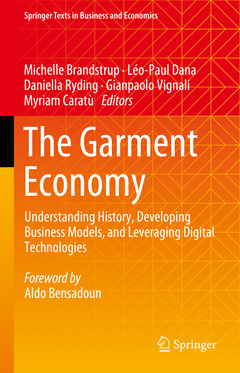The Garment Economy, 2023 Understanding History, Developing Business Models, and Leveraging Digital Technologies Springer Texts in Business and Economics Series
Coordonnateurs : Brandstrup Michelle, Dana Léo-Paul, Ryding Daniella, Vignali Gianpaolo, Caratù Myriam

This book introduces the reader to the business of clothes, with flashbacks into the past, business models of today, and ideas for a sustainable future. Historical perspectives discuss the cotton industry in India, Bangladesh, Greece, and Central Asia, which help trace the evolution of the clothing industry during the 20th century. Chapters also discuss fashion marketing, greenwashing, blockchain in the fashion supply chain, social media, sustainability issues, and sensory models. Several business models are explained; topics covered include blue ocean strategy, the unstitched market, the luxury sector, access-based consumption, and ethics. Among other topics explored are the future retail experience, consumer value creation, technology, and the impact of virtual atmospheres. The book also includes helpful case studies in understanding the country and culture-specific nuances of the clothing business.
Michelle Brandstrup studied at Kingston University and obtained her post-graduate education at the Designskolen Kolding, Denmark. With a diploma in tailoring, and also degrees in fashion design, she has been employed in Berlin, Paris and at Christianshavn, in Copenhagen. She is currently a fashion designer at Kabooki, where she has been heading the launch of a new brand. She was nominated for the Scandinavian Designers Nest award.
Léo-Paul Dana is a professor at ICD Business School, and affiliated with LUT School of Business and Management, Lappeenranta University of Technology, Finland as well as with Sorbonne Business School, Université Paris 1 Panthéon-Sorbonne. A graduate of the Faculty of Management at McGill University and of HEC-Montreal, he has served as Marie Curie Fellow at Princeton University and visiting professor at INSEAD. He has published extensively in a variety of journals and is the author of several books.
Daniella Ryding(Ph.D.) is a Senior Lecturer in Fashion Marketing, and is both editor and author of several fashion business text books for the Palgrave Series in Luxury Fashion Retailing and Palgrave Springer Nature. The author has published over 50 peer reviewed papers in leading business journals within the field of marketing, including, but not limited to the Journal of Retailing and Consumer Services, the European Business Review, the International Journal of Consumer Studies, and the Journal of Fashion Marketing and Management. The author enjoys collaborating with a network of international academics to develop contemporary marketing thought. Daniella has a passion for researching consumers in their locations and environments within the areas of digital marketing and the circular economy.
Gianpaolo Vignali is Senior Lecturer in Fashion Business at the University of Manchester (UK). With a first degree in Mathematics, and then a Master's in Strategic Management, his career stages involvedM
Date de parution : 07-2023
Ouvrage de 630 p.
15.5x23.5 cm



